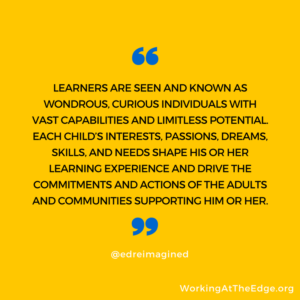 This past week I ran across an article online titled Gifted and talented kids: How do you nurture a curious mind? It’s a fascinating read to learn what five outstanding young minds are accomplishing as a result of sustained curiosity and the support of caring adults. Yes, these are amazing young learners with great stories!
This past week I ran across an article online titled Gifted and talented kids: How do you nurture a curious mind? It’s a fascinating read to learn what five outstanding young minds are accomplishing as a result of sustained curiosity and the support of caring adults. Yes, these are amazing young learners with great stories!
While it’s exciting these learners have demonstrated and cultivated talents in math and science (highly valued in society at the moment), the focus of the stories sparked reflection on my own practice and beliefs about learning and equity.
Every learner, young and old, has gifts and talents. As educators, we must help all to connect to their curiosities/interests and find what makes the heart sing. Why do we place particular value on giftedness in the subjects of math and science? Yes…these learners could be the ones that literally change the world in the not-so-distant future. But “world” is relative. What about giftedness in screenplay writing, connecting people, making music, designing, repairing cars, and anything else? Should we instead be looking at giftedness as pervasive and co-defined with the learner instead of what is only valued by the system and adults?
This vision of learning from Education Reimagined can help us reframe our current notions of giftedness and talent across the learner population.
Learners are seen and known as wondrous, curious individuals with vast capabilities and limitless potential. Each child’s interests, passions, dreams, skills, and needs shape his or her learning experience and drive the commitments and actions of the adults and communities supporting him or her.
What would our schools be like if we believed every learner was wondrous, curious and capable with limitless potential, and if we listened and valued their voices in defining their own gifts and talents?
How are beliefs about learning as a school or leader reflected in how giftedness and talent are defined and valued?
Connect with Randy on Twitter and on the TLTalkRadio podcast!
Get new content delivered to your inbox and the ebook 3 Key Principles of Digital Transformation. The ebook contains valuable information from my experience leading a digital transformation and working with a variety of stakeholders over the past decade.
- A silver lining - January 22, 2022
- Is our use of tech working against us? 🤔 - September 8, 2021
- What’s NOT going to change in the next 10 years? 🤔 - September 7, 2021
To repurpose a phrase from Sir Ken Robinson: Maybe we should be asking ourselves “what is a student’s gifts?”not “Is a student gifted?” I recall a district once trying to approach every child as if he or she had a GIEP. It caused disturbance to the sort, rank and label paradigm.